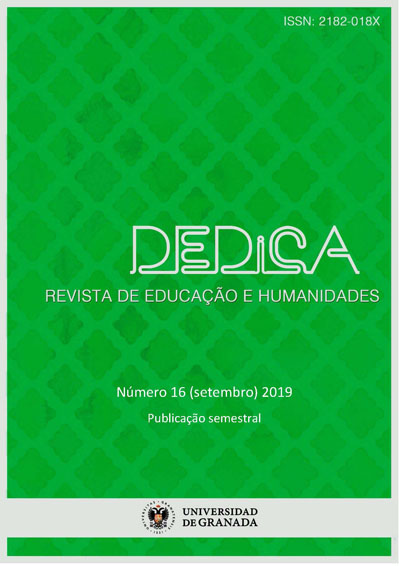Critical literacy in Teacher Training: how to train Early Childhood Teachers to educate a critical citizenship?
DOI:
https://doi.org/10.30827/dreh.v0i16.9113Keywords:
critical literacy, early childhood education, social knowledge, teacher trainingAbstract
The article shows the initial results of an intervention in teacher training that has helped us to design an investigation. It is elaborated from a biographical narrative resulting from the teaching practice of future teachers that has allowed us to understand the relevance that they give to the need to address critical literacy from the first levels of schooling.The design of the teacher training proposal was based on previous experiences in which the use of popular culture and new technologies, facilitate a comprehensive teaching for the construction of identities in multicultural contexts.The experience has allowed us to understand how to help future teachers to differentiate between facts and opinions, argue about the veracity and reliability of sources, distinguish ideology from classroom resources and identify silences. Together with them, we knew what relevant social issues can be addressed in the classroom of early childhood education, how to teach how to interpret information about relevant social issues, how to approach critical literacy with children's education students.In short, the experience aims to know how to help future teachers to rethink social knowledge and overcome internal conflicts in the interpretation and treatment of relevant social issues from critical literacy.Downloads
References
Alexander, G.; Shosani, Y. (2015). Dialectic Explication of creativity. In Egan, K., Gillian, J. & Madej, K. (eds.). Engaging Imagination and Developing Creativity in Education (pp. 17-32). Cambridge: Cambridge Scholars Publishing.
Bearne, E. et al. (2004). More than words: multimodal texts in the classroom. London: QCA.
Cassany, D.; Castellà, J. M. (2010). Aproximación a la literacidad crítica. Perspectiva, 28(2), 353-374. doi: rí1t0ic.a5007/2175-795X.2010v28n2p353
Dozier, C.; Johnston, P. l. & Rogers, R. (2006). Critical literacy/critical teaching: Tools for preparing responsive teachers. New York: Teachers College Press.
Egan, K. (1991). La comprensión de la realidad en la educación infantil y primaria. Madrid: Ediciones Morata.
Egan, K. (2000). Mentes educadas: cultura, instrumentos cognitivos y formas de comprensión. Barcelona: Paidós.
Egan, K. (2003). Start with What the Student Knows or with What the Student Can Imagine? Phi Delta Kappan, 84(6), 443–445.
https://doi.org/10.1177/003172170308400606
Egan, K. (2010). La imaginación: una olvidada caja de herramientas del aprendizaje. Revista de Investigación Científica, 14, 12-16.
Egan, K.; Gillian C. (2012). Imaginación, herramientas cognitivas y alumnos renuentes. Revista de Investigación Científica, 16(2), 9-18.
Evans, J. (Ed.) (2004). Literacy moves on: using popular culture, new technologies and critical literacy in the primary classroom. New York: David Fulton Publishers.
Fisher, A. (2008). Teaching comprehension and critical literacy: investigating guided reading in three primary classrooms. Literacy, 42, 19-28.
Flick, U. (2007). Introducción a la Investigación cualitativa. Madrid: Ediciones Morata.
Flores Dueñas, L. (2005). Lessons from la maestra Miriam: Developing Literate identities through Early Critical Literacy Teaching. Journal of Latinos and Education, 4(4), 237-251.
Flores-Koulish, S.; Smith-D´Arezzo, W. M. (2016). The Three Pigs: Can they blow us into critical media literacy old school style? Journal of Research in Childhood Education, 30(3)349-360.
Luke, A. (2012). Critical literacy: Foundational notes. Theory into Practice, 51(1), 4-11.
Miyazaki, K. (2010). Teacher as the imaginative learner: Egan, Saitou and Bakhtin. In Egan, K. & Madej, K. (eds.). Engaging Imagination and Developing Creativity in Education (pp. 33-44). Cambridge: Cambridge Scholars Publishing.
Mosley, M. (2010). Becoming a literacy teacher: Approximations in critical literacy teaching. Teaching Education, 21(4), 403-426.
Polito, T. (2005). Educational Theory as Theory of Culture: A Vichian perspective on the educational theories of John Dewey and Kieran Egan. Educational Philosophy and Theory, 37, 475–494. doi:10.1111/j.1469-5812.2005.00136.x
Rogers, R.; Mosley Wetzel, M. (2014). Designing Critical Literacy Education through Critical Discourse Analysis. Pedagogical and Research Tools for Teacher Researchers. New York: Routledge.
Santisteban, A.; González Valencia, G. (2013). Sociedad de la información, democracia y formación del profesorado: ¿qué lugar debe ocupar el pensamiento crítico? En J. J. Díaz, A. Santisteban y A. Cascajero (Eds.), Medios de comunicación y pensamiento crítico. Nuevas formas de interacción social (pp. 761-770). Guadalajara: AUPDCS / Universidad de Alcalá.
Santisteban, A. et al. (2016). La literacidad crítica de la información sobre los refugiados y refugiadas. En García Ruiz, C.
R., Arroyo, A. & Andreu, B. (eds.). Deconstruir la alteridad desde la Didáctica de las Ciencias Sociales: Educar para una ciudadanía Global (pp. 550-560). Madrid: AUPDCS/Entinema. Universidad de Las Palmas.
Wodak, R.; Meyer, M. (2003). Métodos del análisis crítico del discurso. Barcelona: Gedisa.












